Solar panels aren’t just for regular stick-built homes. Solar panels can be used on most mobile homes whether you have a single wide or double wide mobile home. In this article solar panels for mobile homes, we will discuss the pros and cons of this energy source.
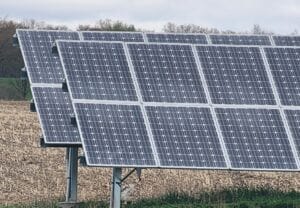
Solar Panels for Mobile Homes
Solar energy and solar panels have become increasingly popular over the last few years. They offer several benefits over traditional energy sources. As with any type of technology, there are also some drawbacks to consider with solar energy.
If you want to learn more about solar panels talk to the experts, check out their blog here at Solar Panels
Running a mobile home on solar power is a great way for mobile homeowners to save money on electricity bills while reducing their carbon footprint. However, starting the process can be daunting without proper guidance. Here are some tips on how to run a mobile home on solar power.
Before installing solar panels, it is important to assess your mobile home’s energy needs. This will help you determine the amount of power you need and the size of the solar panel system required. The installation costs of solar panels for mobile homes can vary depending on the size of the home and the amount of power needed to run it.
When choosing solar panels for your mobile home, consider running watts as they determine the amount of power that can be generated and used. It is also essential to have an inverter that converts DC (direct current) from solar panels into AC (alternating current) that powers appliances in your mobile home.
To adopt solar power, you must first install a mounting system for your panels, which should be placed in an area with maximum sunlight exposure. Once installed, connect them to an inverter and battery bank. Battery banks store excess energy generated by the panels during peak hours so that it can be used at night or when there is insufficient sunlight.
Solar Panels for Mobile Homes: Carbon
Solar-powered mobile homes not only benefit individual homeowners but also housing residents who want to reduce their carbon footprint and live sustainably. Running a community of mobile homes on solar power requires more planning and investment than running one single unit but has significant environmental benefits.
There are many advantages to running a mobile home off-grid with clean energy sources like solar power alone; however, it may not always be possible due to location or budget constraints. In such cases, hybrid systems powered by both traditional grid electricity and renewable energy sources like solar can still provide significant cost savings while reducing carbon emissions.
Solar Panels for Mobile Homes: Pros of Using Solar Energy
Your first advantage to using solar energy is the cost savings that you will get. This can significantly reduce your energy bills with solar. Your initial cost for solar might be higher but once you get past the initial cost you will start to save on your electricity bills.
If you use small amounts of energy, solar panels will back energy up to your electricity provider. This simply means you are using less energy than your solar panels are producing. It can provide you with money towards your energy bill. The term for this service is called Net Metering. Discuss this with your electricity provider to see what programs they have available.
Solar panels are also very environmentally friendly. Solar energy is a clean and renewable power source. This helps to reduce your carbon footprint on the world, this will help to protect the environment.
Reduced Carbon Footprint: Solar Panels Mobile Homes
Using solar power for a mobile home is an excellent way to reduce your carbon footprint and lower greenhouse gas emissions. Solar panels generate electricity by converting sunlight into energy, which means that there are no harmful pollutants released into the air during this process. By using solar power, you can significantly reduce your reliance on non-renewable energy sources like fossil fuels, which are not only expensive but also damaging to the environment.
Lowered Greenhouse Gas Emissions
According to a report by the Environmental Protection Agency (EPA), greenhouse gas emissions from residential buildings account for about 20% of all greenhouse gas emissions in the United States. By using solar power for your mobile home, you can help reduce these emissions significantly. This is because solar panels do not emit any harmful pollutants or greenhouse gases into the atmosphere during their operation.
Decreased Dependence on Non-Renewable Energy Sources
Mobile homes typically rely on non-renewable energy sources like propane and diesel generators to provide electricity. However, these sources of energy are not only expensive but also contribute to environmental degradation. By installing solar panels on your mobile home, you can decrease your dependence on these non-renewable energy sources and save money in the long run.
Reduced Electricity Bills and Long-Term Cost Savings
One of the most significant benefits of using solar power for a mobile home is that it can lead to reduced electricity bills and long-term cost savings. While installing solar panels may require an initial investment, they pay off over time through reduced electricity bills and long-term cost savings. According to EnergySage, homeowners who install solar panels can expect to save between $10,000-$30,000 over 20 years.
Increased Energy Independence and Self-Sufficiency
By installing solar panels on your mobile home, you can increase your energy independence and self-sufficiency. This is particularly important if you live in remote areas where access to the grid is limited or non-existent. With solar power, you can generate your electricity and be less reliant on external sources of energy.
Improved Air and Water Quality
Using solar power for a mobile home has many environmental benefits, including improved air and water quality. Unlike traditional energy sources like fossil fuels, solar panels do not emit any pollutants into the air or water during their operation. This means that using solar power can help improve air and water quality in your community.
Solar Panels for a Mobile Home: Drawbacks
Initial Installation Costs Can Be High
One of the potential drawbacks to using solar power for a mobile home is the initial installation cost. While solar panels can save money in the long run, the upfront costs can be significant. The price of solar panels has decreased over time, but it still requires a substantial investment to install a system that will generate enough energy to power a mobile home.
The cost of installation depends on several factors such as the size and type of solar panel, battery storage capacity, and any additional equipment needed. It’s essential to consider all these factors before investing in a solar power system for your mobile home.
Solar Panels Require Adequate Sunlight to Generate Power
Another potential drawback of using solar power for a mobile home is that it requires adequate sunlight to generate power. If your mobile home doesn’t receive enough sunlight due to its location or weather conditions, you may not get enough energy from your solar panels.
It’s crucial to determine how much sunlight your area receives throughout the year before investing in a solar power system. You should also consider any obstructions such as trees or buildings that could block sunlight from reaching your panels.
Ensure That the Roof Structure Is Strong Enough to Support the Weight of the Solar Panels Before Installing
Before installing mobile home solar panels on your roof, it’s essential to ensure that the roof structure is strong enough to support their weight. Solar panels can be heavy and require a sturdy base for installation.
Working with a professional installer can help determine whether or not your roof structure is sufficient for installation. They will also know how best to position each panel for maximum sunlight absorption while minimizing shading from nearby trees or buildings.
Battery Storage Capacity May Not Be Sufficient for Extended Periods of Low Sunlight
While batteries can store excess energy generated by your solar panels during peak hours, their capacity may not be sufficient for extended periods of low sunlight. If there are several days without adequate sunlight, you may need an alternative source of backup power such as a generator.
It’s essential to have an understanding of battery storage capacity and how much energy you’ll need during times when there isn’t enough sunlight. This will help you determine if additional batteries or backup generators are necessary.
Maintenance and Repair Costs Can Add Up Over Time
Like any other piece of equipment, solar panels require maintenance and repairs over time. These costs can add up quickly, especially if you’re using them for an extended period.
It’s important to budget for maintenance and repair costs when considering a solar power system for your mobile home. Regular cleaning, inspection, and replacement of damaged panels or equipment can help keep your system running efficiently.
Solar Panels Can Be Damaged by Extreme Weather Conditions
Extreme weather conditions such as hailstorms or high winds can damage solar panels. While most solar panels are designed to withstand severe weather, they’re not indestructible.
It’s essential to have insurance coverage for your solar power system in case of any damage caused by extreme weather conditions. You should also inspect your panels regularly after severe weather events to ensure they’re functioning correctly.
Backup Generator May Still Be Necessary for Emergencies
Finally, it’s important to note that even with a solar power system in place, a backup generator may still be necessary for emergencies. If there’s an extended period without sunlight or if the batteries run out of energy, you’ll need an alternative source of power.
Investing in a backup generator can provide peace of mind during emergencies and ensure that you always have access to electricity when you need it.
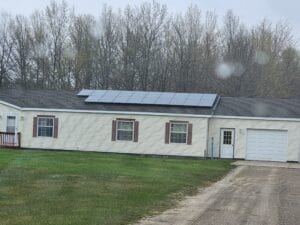
Solar Panels for Mobile Homes: Battery Backups
Solar companies do sell battery systems that can store your access energy as well. If you use less energy than your panels produce the energy can be stored on nearby batteries. The major drawback to this is the batteries are extremely expensive to purchase. The cost does vary depending on the battery chemistry, and the manufacturer.
On average the battery system can cost between $5,000 and $20,000. The savings can be offset by utilizing the energy that the system stores, but it will take a while for that to work. There are also additional rebates and incentives in place through the government for these types of utilities.
Before investing in any type of solar panel system it is best to do your research. Find a system that will fit your needs and fit within your budget as well.
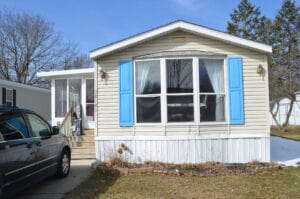
Cons of Using Solar Energy for Your Mobile Home
The biggest disadvantage to installing a solar panel system in your mobile home would be the up-front cost. These units are quite expensive to install but they do add value to your home and will save you in the long run.
Solar panel systems are becoming more and more cost effective as technology progresses. The solar experts are finding different panels and technologies to capture angles of the sunlight for higher efficiency. Years from now this technology will be quite different than what it is even today.
Another big disadvantage to solar panels is the area that they take up. Solar panels are large, and they need room to operate. Most solar panels are installed on a mobile home roof but not every roof top is equipped to handle solar panels. They also may not face the sunlight correctly to capture the sunlight needed to be cost effective.
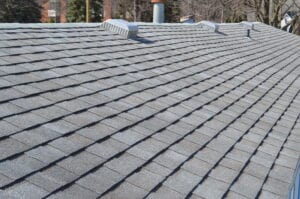
Sunlight needs to be correctly positioned on these units so they can run efficiently. Rain, clouds, snow, and sleet can prevent these units from running to their most optimal degree.
If you do not have a roof that can catch the sunlight correctly these panels will have to be installed in a side yard or on a garage roof nearby. This can take up room and be an eye soar for many.
Finally, solar panels while they are energy efficient do have a slight impact on the environment due to manufacturing the unit.
Solar Panels for Manufactured Homes Cost
Solar panels are most expensive when they are first set up. The reason solar panels are expensive initially is because these reasons:
The cost to manufacture solar panels is very expensive. These panels are made of photovoltaic cells that convert sunlight into electricity. The process for these cells can be very expensive due to the use of specialized equipment to complete this process.
The installation of a solar panel system is quite expensive. There are several steps that need to be followed to install this type of unit. From permits to design to physically installing the panels. This can all add up to making these units expensive and pricy to install.
Solar panel units are constantly changing. Over time the cost of production and installation is expected to decrease. This process is still in the early stages, and it will take time and testing to make them more cost effective.
The cost to install a solar panel system typically runs anywhere from $15,000 – $20,000 before any incentives or rebates have been applied.
Be sure to shop around for different quotes on your solar panel system. Prices can vary greatly between companies.
Finding a Solar Panel Specialist Near You
When shopping to find a solar panel specialist you will want to do your homework. Be sure to find someone who comes with local references and is licensed to do the job. You will also want to find someone who has been in business for a few years.
One of the benefits of a solar panel system is that the installer typically insures the units for so many years. You want to make sure that the company that installs your unit will be around to maintain your unit.
Most warranties on these types of units range from 10 to 25 years. The warranties typically cover any manufacturer defect or issue that can cause problems during normal use. This is important if you ever have issues with your panels. Warranties will protect you from additional costs.
No matter which company you decide to go with make sure to read the fine print and talk with the company’s references. Doing these steps will save you from added costs to installing your mobile home solar panel system.
Professional installers have experience working with different types of roofs and ensuring that they are strong enough to support the weight of solar panels without causing damage. They also know how best to position each panel for maximum sunlight absorption while minimizing shading from nearby trees or buildings.
Hire Professional Installers for Solar Panel Installation and Solar System Installation to Ensure Proper Setup
While DIY installation might seem like an excellent way to save money on installation costs, it’s not always the best option when it comes to installing mobile home solar panel systems. Hiring professional installers ensures that everything is set up correctly from start to finish.
Solar Panel System Mobile Home Park
If you are contemplating utilizing a solar panel system within a mobile home park there are steps, you should follow first. The very first thing you will need to do is talk with the manager at the park office. Solar panels take up a lot of room and can be displeasing to the eye. Your park office may have rules and regulations against solar in your park. Each park is different, so it is important that you speak with them.
Many times, you will find that park offices will not allow solar panels to be placed within their park location. An option may be a portable solar unit that is small and possibly placed in a back yard out of site. Smaller solar panels can run quite a few things in your home and may be just what you need.
If the park does allow the systems to be installed, make sure to get it in writing. You do not want to install the unit only to be caught in a he said she said battle during installation process.
You might be interested in our article Moving a Mobile Home From a Park.
Solar Panels for Mobile Homes: Value
Solar panels will help to increase the value of your mobile home. Even though you will spend more for the initial cost to install solar panels they do add value. The amount of value added really depends on several factors.
The size of the solar panel system does play a big part in the value of the system. Does the solar panel system run your whole home and garage or just a part of your home?
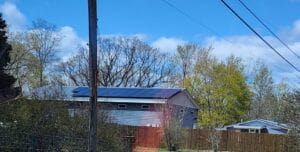
A recent study by Lawrence Berkeley National Laboratory stated on average, a home’s value would increase by $4 per watt of installed solar power. So, if you installed a 5-kilowatt solar panel system, it could potentially add $20,000 in value to your home.
Studies have also shown that homes with solar panels do tend to sell quicker than homes without them.
Read our article on How Much Is My Mobile Home Worth?
Solar Panels: Renewable Energy Credits
The government likes solar and green energy programs. They offer a tax credit for installing solar panels. This tax credit is made available by (SREC) which stands for Solar Renewable Energy Credits. These incentives and rebates can save you thousands on your solar panel system. Be sure to check into this when consulting with your local solar specialist.
Off Grid Mobile Home
Another benefit of utilizing solar is not being dependent on the utility companies. With solar you can utilize your own energy which is great for off grid living.
When neighboring homes lose power, you won’t with off grid living. Solar power will keep your lights and electricity going. This helps to improve your independence on someone else to provide you with your electrical needs.
To be completely self-sufficient your mobile home would need to be connected to off-grid electricity, water, and a sewer system.
This type of set up is best for a mobile home that sits on private land as opposed to one that sits in a mobile home park.
Overall, living off grid can offer a unique way of living, but it requires a lot of commitment and responsibility to managing basic needs.
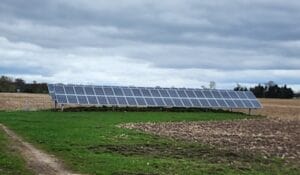
What Do My Solar Panels Power
To gain the most efficiency from your solar panels and take advantage of the full tax break you will want a system that can power your whole home. It is possible, however, to have a smaller solar panel system that only runs certain items in your home.
If you are looking for ways to save money but you still want to be connected to the power grid, this can be an effective option as well.
To set up a system like this you will want to consult with a local solar specialist. You can discuss what items you want to run off solar energy in your home and they can specify a panel system that will do just that.
Portable Solar System for Your Mobile Home
There are portable solar systems that can be used for your mobile home. These compact systems can be set up quickly and used to generate electricity to your mobile home. These units typically consist of a panel, battery, charge controller, and inverter.
The biggest advantage to a portable system is its portable. It can be moved to different locations and used where needed. This makes this type of unit a popular choice for camping, outdoor activities or to be used in areas where grids are not available yet.
Portable units really have a lower output than the traditional solar power systems. They typically cannot power your whole home. Do your research on these units before you decide to purchase so you can be sure they will run what you need.
Park Model or Tiny Home Solar Panel System
A smaller portable system might be able to run most of the items inside a park model home. Depending on how much energy you utilize throughout the day. Again, it is best to have a specialist decide how much power you need to power your home. It is possible to utilize these units for tiny homes and park models as well.
Lightweight Solar Panels for Mobile Homes
Lightweight solar panels are a great option for a singlewide or doublewide mobile home. A solar panel specialist will be able to tell you what will work for your mobile home. A lightweight solar panel is a great alternative because they are easy to install, and they do not add a significant weight to the roof system. Discuss this lightweight option for optimal efficiency, it could save you money over other options.
DIY Solar Panel System
A DIY solar panel system is typically installed and maintained by the property or mobile homeowner. These systems can be built and installed but it takes a vast knowledge of electricity and basic construction principles. There are many videos and eBooks that can help to guide you through the process, but it is not for the faint of heart.
How to Make a Mobile Home More Energy Efficient
Making your mobile home more efficient is important. It can save you and your family thousands of dollars over the years. If you invest in solar it will save you thousands but here are some other ideas for making your home more efficient.
Do you have old appliances? Each year appliances become more energy efficient. Replacing your old appliances with new appliances can save you money. This can trim some money off your electric bill. The government also runs programs and incentives to update these types of units in your mobile home.
Updating mobile home windows and doors can have a big impact on your electric bill each month. Drafty windows and doors account for a large part of your electric bill each month. If you have broken windows replacing them will have a big impact on your bill as well.
Do you have an old mobile home water heater? Water heaters run constantly to keep your water warm. Putting a blanket on your hot water heater or replacing it will help to save you money.
Make sure your mobile home is well insulated. Insulation helps to keep your mobile home warm. Replacing insulation under your mobile home is very important to keeping your mobile home more energy efficient.
Install a programmable thermostat. If you work away from your home, there is no need to keep your mobile home at 70 degrees during the day. Set your thermostat to come on just before you come home and to turn it down just before you leave. This little trick can save you hundreds on your heating and electricity bill.
You might also be interested in our article The Average Electric Bill for a Mobile Home.
Assessing the viability of solar power for your mobile home
Assessing your mobile home’s energy usage is the first step in determining if solar power can meet your needs. Start by analyzing your monthly electricity bills to determine how much energy you use on average. This will give you an idea of the size of a solar system you need to generate enough power to meet your needs.
It’s also important to consider the energy efficiency of your appliances and lighting. Replacing outdated, inefficient appliances with newer, more efficient models can help maximize the efficiency of a solar system and reduce your overall energy consumption.
When calculating the cost of installing a solar system, it’s essential to compare it to the potential savings in energy bills over time. While upfront costs may be significant, investing in a solar system can save you money in the long run by reducing or eliminating your monthly electricity bills.
To determine the capacity of a solar system needed to power your mobile home based on your energy usage and location, consult with a professional. They can assess factors such as available sunlight and shading to provide an accurate estimate of how many panels you need.
Another factor to consider when assessing the viability of solar power for your mobile home is where to install your panels. Depending on where you live, there may be laws or regulations regarding where you can place them. It’s essential to do research before installing any equipment.
Solar Panels for Mobile Homes: Wiring and Connecting to Your Mobile Home’s Electrical Grid
Determining Your Electricity Consumption Needs and Wattage Requirements
Before installing a solar power system in your mobile home, it is essential to determine your electricity consumption needs and wattage requirements. This step will ensure that the solar power system can meet your electricity needs without overloading the grid. You can start by assessing the number of electrical appliances you use daily, their wattage, and how long you use them.
Once you have determined your electricity consumption needs, consider the wattage requirements for your solar power system. The size of the solar panels will depend on how much energy you need to generate each day. Experts recommend using a solar panel with a capacity of 100 watts per hour or more for mobile homes.
Checking Local Building Codes and Regulations
Before installing a solar power system in your mobile home, it is crucial to check local building codes and regulations. Each state has its regulations regarding renewable energy systems’ installation, so make sure to research these before starting any installation work.
Failure to comply with local building codes may lead to legal issues or fines down the line. Therefore, it’s essential to do thorough research beforehand and consult with experts if necessary.
Using High-Quality Installations and Equipment
To ensure efficient and reliable electricity production while minimizing electricity costs, it’s crucial to use high-quality installations and equipment when setting up a solar power system in your mobile home. EcoFlow portable power stations are an excellent example of such equipment.
EcoFlow portable power stations come equipped with advanced features such as fast charging times, multiple ports for different devices/appliances, built-in surge protection technology that prevents damage from voltage spikes or surges in electricity supply lines.
Considering Using a Generator or Garage
If you produce excess wattage from your solar power system than what you need at any given time, consider storing this excess wattage for later use in a generator or garage. This strategy will help reduce electric bills even further by using stored wattage instead of relying on the grid.
A generator can be an excellent backup source of power for your mobile home in case of emergencies or power outages. A garage, on the other hand, can serve as a storage space for excess wattage produced by your solar power system.
Solar Panels for Mobile Homes: Maintaining and Troubleshooting
Regularly Clean the Solar Panels to Ensure Maximum Sunlight Absorption
One of the most important aspects of maintaining a mobile home solar system is keeping the solar panels clean. Dirty or dusty solar panels can reduce the amount of sunlight absorbed and, as a result, decrease the efficiency of your system. To keep your panels in top condition, you should clean them at least twice a year or more frequently if you live in an area with high levels of dust or pollution.
Cleaning your solar panels is relatively easy and can be done using just soap and water. However, it’s important to avoid using abrasive materials that could scratch the surface of your panels. It’s essential to turn off your system before cleaning to avoid electric shock or damage to your equipment.
Check the Solar Power System’s Battery Regularly and Replace It If Necessary
The battery is one of the most critical components of any mobile home solar power system. It stores energy generated by your solar panels during daylight hours for use at night or on cloudy days. Over time, however, batteries lose their ability to hold a charge effectively and may need replacing.
To ensure that your battery is functioning correctly, you should check its voltage regularly using a multimeter. If you notice that its voltage has dropped significantly below its rated capacity, it may be time for a replacement.
Homeowners Should Be Aware of the Household Appliances’ Power Consumption to Prevent Overloading the System
Mobile home solar panel systems are designed to power specific household appliances, such as lights, fans, and small electronics. It’s essential to be aware of your appliances’ power consumption and avoid overloading your system.
To prevent overloading, you should keep track of how much energy each appliance uses and limit their use during peak hours when your solar panels may not be generating as much energy. You can consider upgrading your system if you need to power additional appliances.
Upgrade the Solar Panel System If Needed to Accommodate Additional Household Appliances
If you find that your current mobile home solar panel system is not meeting your energy needs or you want to add more appliances, it may be time for an upgrade. Upgrading your system can increase its capacity and enable it to generate more energy while powering additional appliances.
When upgrading, consider factors such as the size of your roof space, the number of panels needed for optimal sunlight absorption, and any additional equipment required. Working with a professional installer can help ensure that everything is set up correctly from start to finish.
The future of solar power for mobile homes
Solar power is becoming an increasingly popular choice for mobile homes, as it provides energy independence and reduces reliance on conventional energy sources. In this section, we will discuss the future of solar power for mobile homes.
Solar Installations and Kits
Solar installations and kits are both viable options for powering a mobile home with solar energy. The installations involve installing a solar array on the roof of your mobile home or on the ground nearby. These arrays consist of multiple solar panels that convert sunlight into electricity that can be used to power your home. On the other hand, solar kits include all the necessary components to set up a small-scale solar system in your mobile home. These kits typically include one or two solar panels, an inverter, charge controller, and battery bank.
Portable Power Stations
Portable power stations are also becoming more popular among mobile homeowners who want to use clean energy while they’re on-the-go. These devices are essentially large batteries that can be charged using solar panels or conventional outlets and provide power to appliances and devices via USB ports or AC outlets.
Community Solar Initiatives
Community solar initiatives are another way that mobile homeowners can access renewable energy sources. These programs allow individuals to buy into a larger-scale solar installation located off-site from their homes but still within their community. Participants receive credit for the electricity produced by these systems which can offset their own electricity bills.
Advancements in Solar Technology
With advancements in technology, including more efficient solar panels and longer-lasting batteries, the future of solar power for mobile homes looks bright. For example, new types of materials such as perovskite have been developed that promise even higher efficiency rates than traditional silicon-based cells. Battery technology has improved dramatically over recent years with lithium-ion batteries becoming smaller yet more powerful.
Solar Panels for Mobile Homes: Thin-Film
In conclusion, solar power is a viable and sustainable option for running a mobile home. It offers numerous benefits such as cost savings, energy independence, and environmental friendliness. However, there are also potential drawbacks to consider such as initial costs, maintenance requirements, and weather conditions.
To assess the viability of solar power for your mobile home, it is important to conduct a thorough analysis of your energy needs and usage patterns. This will help you determine the size and type of solar system that best suits your needs.
It is recommended that you seek professional assistance. Proper installation is crucial in ensuring safety and optimal performance.
Maintenance and troubleshooting of your mobile home’s solar system should also be done regularly to ensure its longevity and efficiency. This includes cleaning the panels, checking connections, monitoring battery levels, and addressing any issues promptly.
As technology advances, thin-film solar panels have emerged as a promising alternative to traditional crystalline silicon panels. They offer several advantages such as flexibility, lightweight design, durability in harsh weather conditions, and higher efficiency in low light environments.
Solar Panels for Mobile Homes: Conclusion
In conclusion, solar panels can save you thousands in tax credits and a lot more on your energy bill. The cost of energy is going to continue to rise year after year but with solar you can control that. Whether you have a singlewide, doublewide, or triplewide you can save with solar energy.
Read our article How Much Does It Cost to Prepare Land for a Mobile Home.
FAQ’s: Solar Panels for Mobile Homes
How many solar panels would it take to run a mobile home?
The number of solar panels needed to power a mobile home depends on factors like energy consumption, location, and panel efficiency. On average, a mobile home may require 10 to 20 solar panels to meet its energy needs.
Can solar panels be added to a mobile home?
Yes, solar panels can be added to a mobile home. You can install them on the roof or on the ground near the home to generate clean energy and reduce electricity costs.
How many solar panels do I need to power a trailer?
The number of solar panels needed to power a trailer or travel trailer varies depending on the energy consumption, location, and solar panel efficiency. A small travel trailer might require around 1-4 panels, while larger ones could need 5-10 panels or more.
How many solar cells does it take to power a house?
The number of solar cells needed to power a house depends on factors like the home’s energy consumption, location, and solar cell efficiency. A typical residential solar panel system may require several hundred to a few thousand solar cells to generate enough electricity to power a house.

